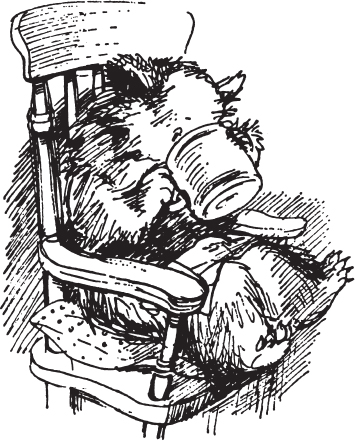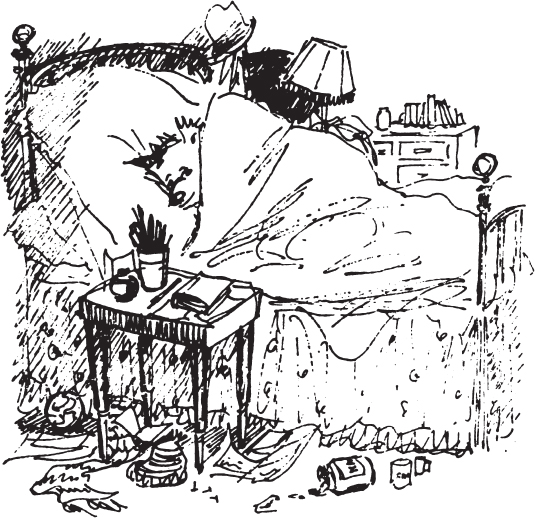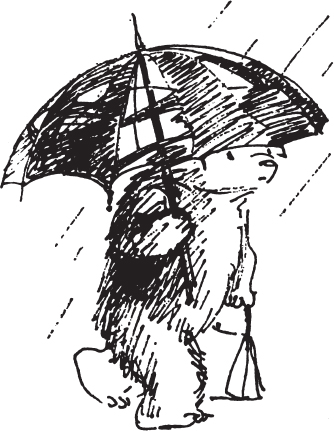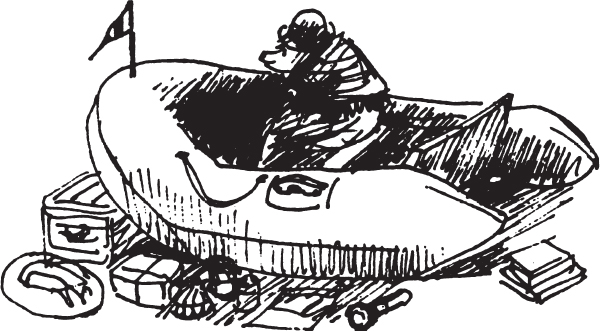COMINGS AND GOINGS AT NUMBER THIRTY-TWO
To say that the Browns could have been knocked down with a feather by Aunt Lucy’s unexpected appearance at the rugby match wouldn’t have been too much of an exaggeration.
They had all become so accustomed to the thought of her being a part and parcel of the Home for Retired Bears in Lima that never in their wildest dreams had they pictured her ever leaving its gates, let alone visiting England.
“Mind you,” said Mrs. Bird, when she came downstairs the next morning carrying Aunt Lucy’s breakfast tray, “the more I think about it the less surprised I am. I can see now where Paddington gets his sense of adventure from.”
“Don’t tell us she stowed away in a lifeboat too!” exclaimed Mr. Brown.
“No,” said Mrs. Bird. “She came by air—on a package tour. She’s a founder member of the Peruvian Reserves Supporters Club, and she gets special privileges.”
“Does that mean she won’t be staying very long?” asked Mrs. Brown.
“Ah, now that I can’t answer,” replied the Browns’ housekeeper. “And I’m not sure if we ought to mention it at this stage. It might sound rather rude.”
It was obvious that as far as Mrs. Bird was concerned, Aunt Lucy could stay as long as she liked, and the Browns hastily changed the subject.
In any case, there were lots of things to talk about, and so many plans to be made that Jonathan, Judy, and Paddington filled up several pages of an old exercise book with a list that included everything from a visit to Paddington Station to watching the Changing of the Guard.
When Aunt Lucy finally appeared she was dressed ready to go out. To the Browns’ surprise she still had a label attached to her poncho. It was not unlike the one Paddington had first worn. On one side it said: PERUVIAN RESERVES SUPPORTERS CLUB, while on the other it had her name, AUNT LUCY, written in large capital letters, and her address: C/O THE HOME FOR RETIRED BEARS, LIMA, PERU.
“Never go out anywhere without a label,” she said firmly, when she saw the others looking at it. “Especially in a foreign country. You never know what might happen.”
“Very wise,” agreed Mrs. Bird. “It’s a pity more people don’t do it.”
The next few days were hectic indeed. With Paddington and Aunt Lucy in tow, the Browns left home early each morning, seldom returning until late in the evening. And every night, over cups of cocoa, Aunt Lucy regaled them with stories of life in Peru, and of the vast plains and mountains that lay beyond the city of Lima. At the end of it all, they were usually so tired they just tumbled into bed and fell asleep as soon as their heads touched the pillows.

All in all, they weren’t sorry when, a few evenings later, she announced before retiring to bed that she would like to spend a quiet time the following day doing some shopping.
Mr. Brown suddenly discovered he had some urgent business to attend to at his office, and it was agreed that Mrs. Brown and Mrs. Bird would take the rest of the family round the shops.
For some reason best known to herself, Aunt Lucy seemed rather pleased when she heard Mr. Brown wouldn’t be coming with them, but it wasn’t until the next day that she revealed exactly why.
“I want to buy him a Christmas present,” she announced.
“Oh, you don’t have to do that,” began Mrs. Brown.
“But I do,” said Aunt Lucy firmly. “It’s been a great comfort to me over the years to know that Paddington has been in safe hands, and I’d like to do something in return.”
“Perhaps you could get him some pipe cleaners,” said Mrs. Brown vaguely. “He’s always running out.”
“Pipe cleaners!” repeated Aunt Lucy, looking most upset. “I’d like something more than that.”
“How about something for his boat, Mrs. Brown?” suggested Paddington.
Recently Mr. Brown had begun taking an interest in boats and he’d even talked about buying an inflatable dinghy large enough to take the family on summer outings. With Christmas looming up the Browns had already started buying some accessories to go with it, in the hope that he wouldn’t change his mind.
“We could go to the place where we bought them,” said Judy.
“It’s jolly good,” agreed Jonathan. “They’ve even got a special machine where they teach you to sail. You put a coin in and it goes up and down just as if you were really at sea.”
Aunt Lucy took all this information in. “I think I like the sound of that,” she said, nodding her approval.
With the rest of the family wanting to do some Christmas shopping as well, it was quite late in the day before they finally reached their destination. As they entered the shop, a salesman detached himself from the counter and came forward to greet them. If he was surprised by the sudden arrival of so many unseasonable visitors, he managed to conceal it well.
“And what can I do for you?” he asked, rubbing his hands together in anticipation.
“We’re really looking for something suitable for an inflatable dinghy,” said Mrs. Brown. “It’s for a small Christmas present.”
The man’s face fell. “Perhaps,” he said, “you’d like a pump . . . or a puncture outfit?”
“A puncture outfit!” exclaimed Paddington, looking most upset. “Mr. Brown hasn’t even got his boat yet!”
He gazed round for Aunt Lucy to see if she had any ideas, but she was already clambering into a large boat which stood in a position of honor in the center of the showroom.
“This is what I would like!” she said.
The salesman’s face lit up. “Ah!” he exclaimed. “I can see I’m dealing with someone who knows about these things. That, madam, is our very best model. It’s our luxury, self-inflating dinghy, as used by the navies and shipping lines all over the world.” He pointed to a small canvas bag standing alongside. “You may find it hard to believe, but that’s the bag it comes in. All you have to do is pull a string and in ten seconds it blows itself up, ready to use.
“It’s practically unsinkable,” he continued, “but should you ever find yourself in trouble, everything has been thought of. It comes complete with an automatic radio distress signal, seasickness tablets, electric torch, fishing line and hook, iron rations, safety pins, and a bag of suitable sweets. It isn’t simply a boat—it’s a way of life!”
Paddington and Aunt Lucy exchanged glances. “It sounds very good value,” said Paddington.
“I’ll take one,” said Aunt Lucy, opening her purse.
Mrs. Brown put her hand to her mouth. “But you can’t . . .” she began.
Aunt Lucy fixed her with a stare. “I’ve made up my mind,” she said.
“It’s much too expensive,” warned Mrs. Bird.
“I have my savings,” said Aunt Lucy. “And Paddington’s allowance.”
“Paddington’s allowance?” echoed the Browns.
“He’s always put some money by out of his bun allowance,” said Aunt Lucy. “He’s often sent me a postal order, but I’ve never spent it.”
The Browns looked at each other. They were learning something new with every passing moment.
“It all adds up,” said Aunt Lucy. “Look after the centavos and the pounds will look after themselves,” she added decidedly. “Besides, it will give me a great deal of pleasure.”
The Browns stood back, powerless to intervene. In any case the salesman had already called over another assistant to help deal with his important new customer, and they were both so busy washing their hands in invisible soap it was obvious there was no turning back. The Browns had no idea what the boat cost, for it didn’t actually have a price written on it, and they didn’t dare ask for fear of receiving another shock. But Aunt Lucy’s purse was obviously more than able to withstand the strain, for the transaction was all over in a matter of seconds.
The salesman was so pleased he even let them have some free rides on the training machine, and Aunt Lucy in particular had such an enjoyable time pulling the lever which made it rock to and fro, it looked at one moment as if the boat might even capsize.
But much to everyone’s relief she at last consented to climb out, and with their shopping finished, they made for the nearest bus stop.
The bus was crowded when it arrived, but Aunt Lucy and Paddington managed to find a vacant seat at the front of the top deck; Jonathan and Judy sat just behind them; and Mrs. Brown and Mrs. Bird made do with some seats near the back.
They hadn’t traveled very far when Aunt Lucy suddenly looked round. “I feel sick!” she announced at the top of her voice.
“Oh, dear,” said Mrs. Brown nervously. “Perhaps it was the boat? She did stay on rather a long time.”
“And hungry!” added Aunt Lucy as an afterthought.
“But she can’t . . .” began Mrs. Brown, and then she broke off. She’d been about to say that no one could possibly feel both things at the same time, but she changed her mind. If anything, Aunt Lucy was able to look even more determined about matters when she had a mind to than Paddington.
“Perhaps I could get some seasickness tablets out of Mr. Brown’s dinghy bag,” said Paddington eagerly. “The man said there are some suitable sweets as well.”
“I should get the tablets out first,” called Mrs. Brown. “But do it carefully,” she warned. “It’s so nicely packed. We don’t want to get all the bits and pieces over the bus.”
Paddington opened the flap of the canvas bag and felt inside. “It’s all right, Mrs. Brown,” he called. “I think I can manage.” He gave a tug at something inside. “I’ll just get this piece of string out of the way first.”
No one, least of all Paddington, knew quite what happened next. In any case, there was certainly no time to think about it. As he pulled the string, there was a loud hissing noise. The canvas bag started to bulge and as he staggered back, clouds of material began to billow forth like some gigantic flower, growing bigger and bigger with every passing moment. The other occupants of the bus watched in silent fascination as the boat began to take shape. It filled the gangway, pressed against the roof, and overflowed onto the seats, letting nothing stand in its way.
The man in the shop had said the operation was over in ten seconds but as Paddington clambered onto his seat for safety, it felt as if his whole lifetime was passing before him.
When the hissing finally came to an end, the hullabaloo that broke out as the passengers struggled to free themselves more than made up for the silence that had gone before.
The noise brought the conductor running up the stairs, and when he reached the top he nearly fell backwards down them again at the sight which met his eyes.
“’Ere!” he cried. “Who brought that up?”
“I didn’t bring it up,” gasped Paddington, as he peered over the stern. “It happened! I think I must have pulled the wrong piece of string by mistake.”
The conductor reached up and rang the bell. “Well, you’d better pull the right one and get it off again, mate!” he exclaimed. “Toot suite! I’m not ’aving these sort of goings-on on my bus!”
Paddington gazed at the dinghy and then at the narrow staircase behind the conductor. “I don’t think I can,” he said unhappily.
“We’ll see what the Inspector ’as to say about that,” said the conductor, making for the stairs. “’Ere, Reg,” he called. “There’s a young bear up ’ere with a boat!”
A pounding of feet heralded the arrival of the Inspector. Taking in the situation at a glance, he removed a penknife from an inside pocket and started to open it. “It’s got a thing-a-me-jig for getting stones out of horses’ hooves,” he said, “but I don’t know about getting boats out of buses. I’ll have to use one of me blades.”
Mrs. Bird grasped her umbrella in no uncertain manner. “You’re not sticking any blades in that dinghy,” she said sternly. “It cost a lot of money.”
The Inspector stared at her. “Are you with this bear?” he demanded.
“Yes,” said Mrs. Bird firmly. “I am.”
“And so am I,” said Mrs. Brown, coming to the rescue.
“And we are too!” called out Jonathan and Judy.
The Inspector looked slightly taken aback at this rallying of forces, but before he had a chance to say anything else there was a loud groan from the front of the bus.
“Crikey!” said Jonathan. “That must be Aunt Lucy!”
“I’d forgotten about her in the excitement,” broke in Judy.
The Inspector gazed in astonishment as Aunt Lucy suddenly appeared round the side of the dinghy. Her poncho was back to front; her hat was all askew; and altogether she looked very much the worse for wear.
“Are you all right, madam?” he asked, grateful for even the slightest kind of diversion he could actually understand and deal with.
“No,” said Aunt Lucy sternly, “I am not all right. Why has the bus stopped? I want to go home!”
“She’s come all the way from Peru,” explained Mrs. Brown, “and she’s not really used to all this rushing about. I’m afraid she’s feeling a trifle seedy.”
The Inspector was still so taken up with Paddington and Aunt Lucy he really only half heard Mrs. Brown’s remark, but as he caught the tail end of it, his whole attitude suddenly changed.
“Why ever didn’t you say so before?” he exclaimed.
He turned to Paddington. “If you’ll kindly tell me your destination, sir,” he said respectfully, “I’ll go down and direct the driver.”
“Well, we were on our way to Windsor Gardens,” said Paddington doubtfully. “Number thirty-two Windsor Gardens . . .”
“It’s not on your route,” broke in Mrs. Brown.
“Think nothing of it,” said the Inspector graciously. He gave the conductor a nudge. “We don’t want any diplomatic incidents, do we?”
The Browns exchanged glances as he clattered back down the stairs.
“I wonder what on earth he meant by that?” exclaimed Mrs. Brown.
“I don’t know,” said Mrs Bird. “And I certainly don’t intend to ask.” She cast a glance at Aunt Lucy, huddled on one of the seats with a very woebegone expression on her face indeed. “If you ask me, the sooner we get back home, the better.”
The Inspector was as good as his word. Shortly after the bus started up it turned off the normal route and began threading its way through the maze of side streets leading to Windsor Gardens.
By the time they reached Number thirty-two they had been joined by several more vehicles: two police cars, an ambulance, and a red tender belonging to the fire brigade.
Mr. Brown was already at home, and the noise as the procession drew up outside the house brought him to the door.
“Stand back, sir,” said one of the policemen as he jumped from his vehicle. “We’ve an emergency here. This bus has been sending out a May Day signal all the way from the West End.”
“A May Day signal!” exclaimed Paddington in surprise as he helped Aunt Lucy down the stairs. “But it’s the middle of December.”
The policeman took out his notebook as a babble of voices rose from all sides.
“A May Day signal,” he said severely, “is an automatic radio signal for emergencies only. It’s used by ships at sea and/or aircraft when they’re in distress. But I don’t know as I’ve ever heard it being used by a bus before.”
Aunt Lucy fixed him with a hard stare. “I’m in distress!” she said firmly. “And I think I may have an emergency any moment now!”
The others stared after her as she hurried indoors closely followed by Paddington.
“I thought you said that bear was going to the Peruvian Embassy?” exclaimed the conductor.
“The Peruvian Embassy?” repeated Mrs. Brown indignantly. “We certainly said no such thing.”
“But you said she was C.D.,” broke in the Inspector. “That stands for Corps Diplomatique, and people in the Diplomatic Corps are entitled to special treatment. That’s why we brought her here.”
“No,” said Mrs. Bird, as light began to dawn. “We didn’t say C.D. We simply said she was feeling seedy. That’s quite a different matter.”
Mrs. Brown turned to her husband. “Aunt Lucy bought you a Christmas present,” she explained. “But I’m afraid it won’t be a surprise any more. It’s stuck on the top deck!”
The policeman snapped his notebook shut. It was becoming more and more difficult to catch up with all that had been going on, and he wasn’t at all sure he wished to pursue the matter.
“I know one thing,” he said. “I bet that’s the only Christmas present this year that’s arrived gift-wrapped in a number fifty-two London bus. Though how we’re going to get it out without spoiling it is another matter.”
“Perhaps,” said Mrs. Bird, “we could try pulling the plug out?”
“Try pulling the plug out?” repeated Mr. Brown. “What is it? A bath?”
“You’ll see, Henry,” said Mrs. Brown. “You’ll see.”
It was some time before order was finally restored, but when the Browns went back indoors carrying Mr. Brown’s boat, they were pleased to find Aunt Lucy sitting at the dining room table looking her normal self again.
Mr. Brown could still hardly believe his good fortune, but she waved aside his thanks and pointed to a row of parcels neatly laid out in front of her.
“They’re really meant for Christmas,” she said. “But as Mr. Brown’s had his, I thought I’d like to see the rest of you open yours before I leave.”
“Before you leave?” exclaimed Mr. Brown. “Don’t say you’re not stopping for Christmas Day?”
“I’m only on an excursion,” said Aunt Lucy. “Besides, I always have my dinner in the Home. We have special crackers with marmalade pudding to follow.”
Mrs. Bird opened her mouth. She was about to say that both these items would be readily available at Number thirty-two Windsor Gardens if Aunt Lucy cared to stay, but she had obviously made up her mind, so instead she joined in the general excitement as everyone began opening their parcels.
Her own present was a paw-embroidered shawl, and there was a similar one for Mrs. Brown.
“What a nice thought,” she said. “It will be just the thing for the long winter evenings.”
Jonathan and Judy each had an enormous jar of honey. “Made,” said Aunt Lucy, “by bees who live in the gardens of the Home for Retired Bears. It’s very sweet because they’re always getting at the marmalade.”
Last, but not least, Paddington opened his parcel. It contained a wrap-round dressing gown, and a pair of Peruvian slippers.
Everyone applauded as he put them on, and a few moments later, after Aunt Lucy had shaken hands all round, he followed her out of the room in order to test them in his bedroom.

“You don’t think,” said Mrs. Bird thoughtfully, as their footsteps died away, “that Paddington’s planning to go back to Peru with her, do you?”
A sudden chill filled the air.
“It’s really for him to decide,” said Mrs. Bird. “We can’t stop him if he wants to.”
“He’d have said something by now if he meant to,” replied Mr. Brown.
He was trying to strike a cheerful note, but he failed miserably as everyone sat lost in their own thoughts. A gloom descended on the gathering, and it remained that way until a little later in the evening when the door opened again and Paddington reappeared. To their relief he was still wearing his dressing gown.
“Isn’t Aunt Lucy coming down too?” asked Mrs. Brown.
Paddington shook his head. “I’m afraid she can’t,” he said rather sadly. “She’s gone home.”
“Gone home?” echoed the Browns.
“Aunt Lucy doesn’t like good-byes,” explained Paddington, when he saw the look of consternation on everybody’s face. “She asked me to say them for her.”
He felt in his dressing gown pocket and took out a sheet of paper. “And she gave me this for you to read.”
Mr. Brown took the note and held it up for all to see. It was written in large capital letters, and at the bottom there was a paw-mark to show it was genuine. It wasn’t quite as neat as Paddington’s, but there was an unmistakable likeness.
“THANK YOU VERY MUCH FOR HAVING ME AND FOR LOOKING AFTER PADDINGTON,” he read. “NOW THAT I’VE GOT USED TO IT, IT DOES SEEM A FUNNY NAME FOR A RAILWAY STATION. AUNT LUCY.”
Mrs. Brown gave a sigh as Paddington took back the note and disappeared upstairs again. “I suppose we ought to be thankful he isn’t going,” she said. “But I do wish Aunt Lucy had stopped a little longer. There are so many things I wanted to ask her. About Paddington’s parents . . .”
“And his uncle,” broke in Judy. “I’ve often wondered what happened to him.”
“And how many bears there are in the Home,” added Jonathan. “And what they do all day.”
“Don’t you think,” said Mrs. Bird wisely, “that in this world it’s rather nice to have some things left unanswered?
“Anyway,” she continued, as she stood up, “if we don’t go upstairs quickly we shan’t be able to say our good nights to Paddington. After all the excitement he’s had today I should think he’ll be asleep in no time at all.”
But for once Mrs. Bird was wrong. When they entered his room he was still very wide awake. He was sitting up in his dressing gown, and from the bulge under his blankets it looked suspiciously as though he still had his new slippers on as well.
He was busily writing in his scrapbook. “I thought I would get everything down while I can still think of it,” he said, dipping his pen absentmindedly into a nearby jar of marmalade. “So many things happen to me I have a job to remember them all sometimes, and it wouldn’t do to miss any out. Aunt Lucy always likes to hear what I’ve been doing.”

“We thought perhaps you were going back to Peru with her,” said Mrs. Brown, as she tucked him in extra tightly for the night.
“Go back to Peru!” exclaimed Paddington. He looked most upset for the moment. “I’m not old enough to retire! Besides, I don’t think Aunt Lucy would like to think of me leaving home, even if I wanted to.”
It was left to Mrs. Bird to voice everyone’s thoughts as they said good night, closed the door, and crept back downstairs again.
“If anyone can think of a nicer Christmas present than that,” she said, “I’d like to meet them!”

